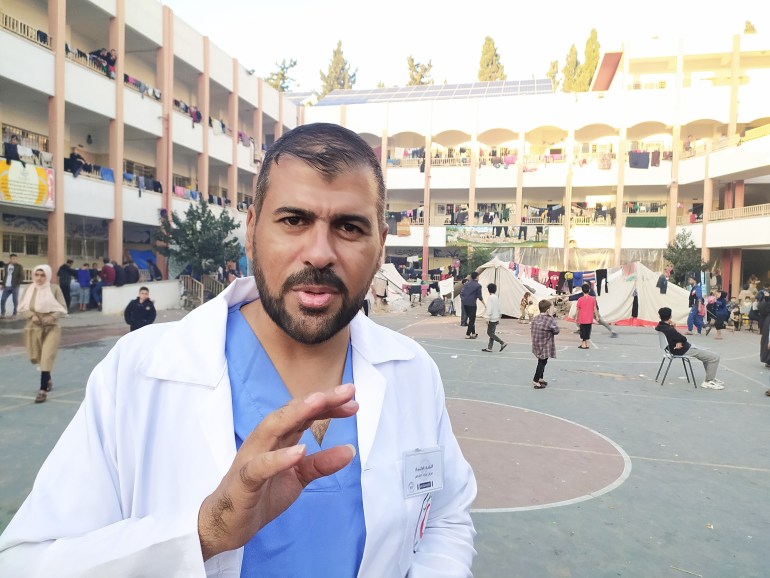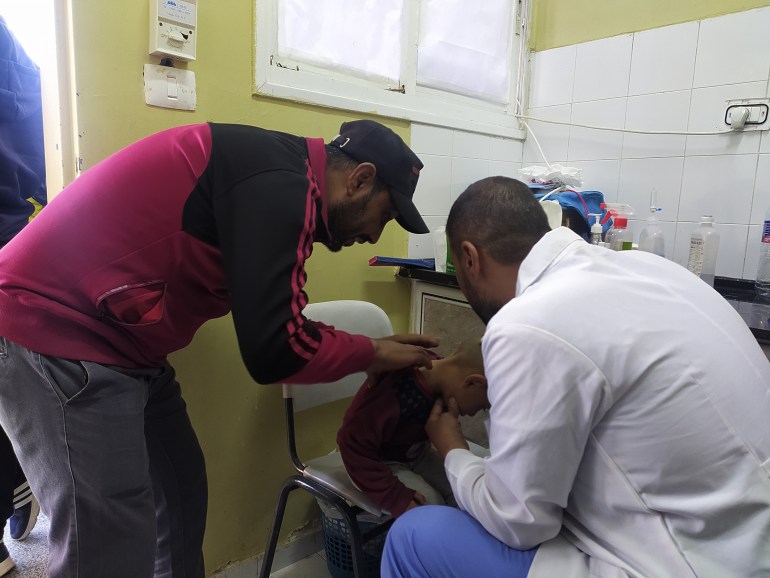They were forced to flee.Gaza doctors continue humanitarian mission policy in Rafah

Gaza – Dr. Mohammed Maadi and his family lived in a shelter inside a public school in the holy city for about two weeks, covered with ordinary blankets on the ground that offered no protection from the freezing cold. Rafa South Gaza Strip.
Dr. Mohammed Maadi and his family, along with other doctors, nurses and their families, took refuge in this school 12 days ago after spending difficult days at al-Ratisi Hospital in Gaza City, surrounded by occupying military tanks. The hospital and military vehicles.
While the hospital was under siege, aerial and artillery bombardment created a fire zone around the hospital walls, re-injuring eight wounded people in wards and departments.
Three days of siege, airstrikes, shelling and Israeli threats against medical staff, patients and the wounded ended with an intervention to evacuate the hospital. International Committee of the Red Cross.
Displaced doctors and nurses told Al Jazeera, “We were forced to evacuate the hospital because we refused for several days to evacuate the hospital without sick and wounded, and approximately 2,000 displaced civilians took refuge in the hospital.”

hard days
“It was the most difficult of my life,” Mohamed Maadi said of the three days of siege at Rantissi hospital. He has not left the hospital since the first day of Israel’s war on the Gaza Strip on October 7 last year.
He told Al Jazeera, “I went into the hospital on the first day of the war and my family joined me, and after the tanks came in and created a suffocating siege of the hospital, we were driven out while shells fell Around us, spread.” Death and fear. ”
Maadi was reunited with his family, including his wife and six children, after Israeli air strikes destroyed two apartments he owned in a residential building in northern Gaza City. “After I realized the danger very early on, I preferred that we stay together, and this war is different from all the previous ones that have occupied Gaza,” he explained.
Before the siege, the hospital’s administration, like other hospitals in Gaza City and the northern Gaza Strip, received Israeli warnings via phone calls and leaflets dropped from planes warning of the need to evacuate the hospital.
As Israel launched its overland invasion of Gaza City from the northern Gaza Strip, the hospital, adjacent to other hospitals in the Al-Nasr neighborhood, became the target of Israeli occupation through siege and direct targeting.
Maadi added that moving from one department to another and from one building to another within the hospital walls is a difficult task and fraught with many risks, as Israeli drones are constantly flying over the hospital Fly, targeting all who move on. ground.

challenges and obstacles
Although Rantisi Hospital specializes in treating oncology and childhood cancers, the impact of Israel’s war and the high number of casualties left it opening its doors to relieve pressure on other public hospitals, notably Shifa Hospital According to Madi, the person responsible was the hospital’s director of nursing and headed a surgical unit set up to deal with war emergencies.
Madi said that the hospital was forced to suspend the work of 11 professional departments and retain three departments of intensive care, pediatric dialysis and oncology to keep up with the impact of the war in Gaza and respond to emergencies. Israeli attacks from the air, land and sea have caused a constant flow of blood.
Mohamed Maadi said that because the hospital is not equipped to deal with war situations, it faces serious challenges and obstacles, lacks a backbone of doctors and nurses, and lacks the medical capabilities and supplies needed to provide care for the wounded. .
This reality prompted nurse Mahmoud Barda and his wife to volunteer at Al-Rantisi Hospital, where they moved with their six children and then left with the others , moved south to the city of Rafah, where he lived with his Madi. family, as well as other hospital staff from Holy City Public Schools.
Barda told Al Jazeera that they spent several horrific days at Randisi Hospital, where death was very close to them, not only as a result of rockets and artillery shells, but also from hunger and thirst.
He added that they have to mix salt water with medical water used in dialysis surgeries to reduce the salinity and use it for drinking, while a few dates a day are their basic meal.
Volunteers and Help
After being forced to evacuate the hospital, Barda chose to accompany his friend Madi to escape to Rafah. Despite this traumatic experience, they and other colleagues decided to continue their humanitarian medical mission in the government school’s evacuation center. According to official estimates, more than 300,000 displaced people have taken refuge in the city.
Doctors and nurses from Al-Quds Public School converted a small room used as a kitchen into a clinic to provide primary medical care to thousands of displaced people in dangerous areas of eastern Rafah or Gaza City and other cities in the northern Gaza Strip.
Barda explained that Randisi hospital staff who had been displaced to the city of Rafah agreed to assign themselves to shelter centers within public schools that were not served by the United Nations Relief and Works Agency for Palestine Refugees (UNRWA) and assistance. ).UNRWA) and reduce the burden on the city’s only hospital, Abu Youssef Al-Najjar Hospital, by providing primary care to displaced patients.
Due to limited capacity, doctors have to deal with dozens of cases every day. Dr. Madi said that the room is very small and does not meet the conditions of a medical clinic. There are also very few medicines and medical supplies inside, and a lot is needed to provide better services. Caring for displaced people in schools.
As Madi and his family were busy checking on a displaced child from an area east of the city of Rafah near the Israeli security fence, he reported that most cases suffered from gastroenteritis, chest infections, and skin diseases such as scabies and smallpox.
He explained that all these illnesses were caused by severe overcrowding, poor hygiene, lack of potable water and lack of qualified facilities in school reception centers to receive large numbers of displaced people, mostly children, women and the elderly.
Subhi Adwan, the father of child Suleiman (3), told Al Jazeera that he gave birth to Suleiman and his twins some 12 years after their marriage because of the disaster inside the refuge center Sexual conditions, he fears for them, and he was forced to flee his home in the east of the city with his family due to airstrikes and Israeli shelling.





